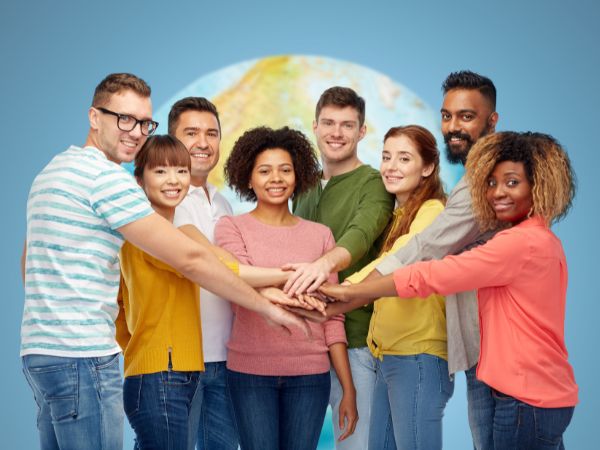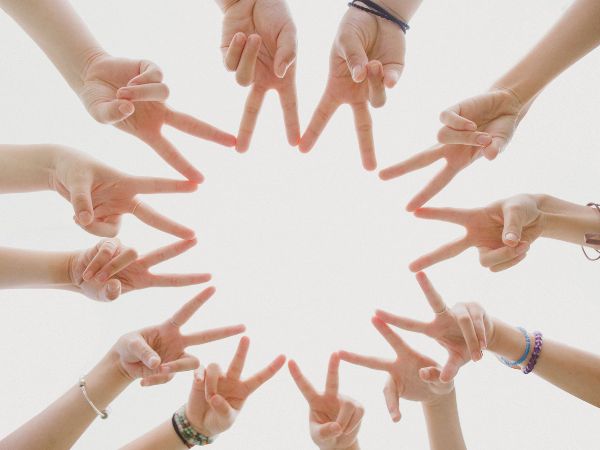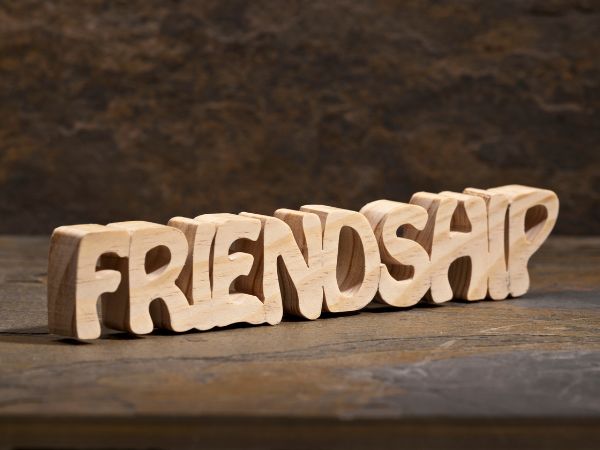International friendships can change the way you live, think, and connect. From big adventures to shared moments you’ll never forget, these friendships will stay with you forever.
Think about the last time you had a conversation with someone from a completely different background than yours. Maybe you were chatting over coffee, or laughing about cultural quirks. The kind of connection you build in your international friendships is more than just interesting—it’s powerful and lasts for a lifetime!

Friendship on its own already brings comfort, support, and meaning to our lives. It reminds us we’re not alone in the world. But when a friendship stretches across borders, languages, and customs, it brings something extra — a sense of connection to the wider world and a chance to grow in ways we rarely expect.
International friendships aren’t about ticking a box for cultural exchange or collecting travel experiences. They’re about forming real bonds with real people who help you understand not only their world, but your own, in a way you never could by staying in your comfort zone.
Indice dei contenuti
Seeing the world through someone else’s eyes
When you connect deeply with someone from another culture, you’re actually stepping into a different way of seeing the world around you.
At first, the contrasts between you and your friend might stand out the most. They might describe a family dynamic that’s the opposite of what you’re used to. Or, they might share how they celebrate holidays in a way that feels completely unfamiliar. But gradually, something shifts. You start to notice overlaps and things in common too. Values that echo your own. Shared frustrations, shared humour, shared dreams.

You realise that “normal” is entirely subject9ve. The way you’ve always done things might feel natural to you, but it’s not universal. And that awareness — that there are infinite valid ways to live — creates empathy, curiosity, and respect.
It also brings humility. You stop assuming your way is the best way. You start listening more, asking better questions, and noticing details you once overlooked.
Sometimes it’s small: how someone greets their grandparents. How they think about time, space, or silence. Other times, it’s big: how they define freedom, love, or success. These are the kinds of insights that stick with you, not because someone lectured you, but because you care about them.
You learn more about yourself, too
One of the quietest, yet most powerful, effects of having international friends is that you start seeing your own culture through a different lens.
You may have grown up celebrating holidays a certain way, using expressions that feel completely ordinary, or assuming that family structures or education systems work more or less the same everywhere. But when someone asks you, genuinely curious, “Why do you do it like that?” — you’re suddenly forced to think about it. Often for the first time.

It’s not always easy to explain why you eat certain foods on a holiday, or why your school days looked the way they did. But in trying to explain, you uncover the layers. The traditions passed down through generations. The emotional memories tied to rituals. The parts of your upbringing that shaped who you are.
This kind of self-reflection can feel like holding a mirror to your own identity — not to criticise or defend, but to understand more deeply. You begin to see which parts of your culture you treasure, which ones you’ve outgrown, and which ones you want to carry forward intentionally.
What starts as a conversation about “how we do things back home” often leads to a deeper appreciation for your own story. And for many, it creates a stronger, more thoughtful sense of identity.
Food, music, and stories that stay with you
There’s something incredibly powerful about cultural sharing that happens through the senses.
Think about the friend who insists you try their favourite childhood snack, or who invites you to their family’s Diwali celebration. The one who sends you playlists filled with their favourite local artists, or explains the meaning behind a lullaby their grandmother used to sing.
These moments stay with you not because they’re big or dramatic — but because they’re intimate and completely personal.

Over time, your life starts to expand in small but meaningful ways. Maybe you now crave Ethiopian injera when you’re missing your friend. Or you start dancing to Brazilian funk when you clean your kitchen. You catch yourself using words from another language in your daily vocabulary. Your Spotify Wrapped might look wildly different than it did a few years ago — and all of that is because someone shared a piece of themselves with you.
And when you return the favour — when you cook your childhood comfort food for them, or play your favourite hometown artist — you’re not just offering information. You’re offering a glimpse into what shaped you. That kind of exchange creates trust, closeness, and joy.
It’s also how cultures stay alive — not in textbooks or museums, but in kitchens, music, stories, and friendships.
Visiting your international friends after your study trip is a completely different experience
There’s a kind of travel that’s curated — guided tours, photo ops, neatly packaged experiences. Then there’s the kind of travel that takes you into someone’s home, their routine, their rhythm.
That’s what travel becomes when you visit international friends.
You’re not a tourist anymore. You’re a guest. Sometimes, you may even be treated as family.
Instead of staying in a hotel, you might sleep on a couch next to a cousin. Instead of ordering from a menu, you’re eating home-cooked, traditional meals passed down from generation to generation. Instead of reading about culture in a pamphlet, you’re living it — sharing meals, running errands, watching how a neighbourhood wakes up in the morning or winds down at night.
And when your friends visit you, you get to do the same. Show them the places that matter to you — your go-to coffee shop, your favourite lookout point, the market where the stallholder knows your name.
These exchanges turn trips into memories you’ll talk about for years. And they create a kind of connection that doesn’t fade just because the plane takes off again.
Finding new interests through international friendship
You know that feeling when a friend gets excited about something — and suddenly you’re interested too, even if it was never on your radar before?
International friendships often come with that spark.
You might not have pictured yourself learning Urdu calligraphy, watching Iranian cinema, or trying Argentine tango. But suddenly, someone you care about is passionate about it — and their excitement is contagious.

These discoveries don’t have to become lifelong passions. But they often unlock a curiosity, or a natural talent for something you’d never imagined yourself trying. Perhaps you may even discover a new part of yourself that was lying dormant, waiting to be nudged awake!
And in some cases, these small nudges turn into something bigger. Maybe you join a taiko drumming group. Maybe you start attending Lunar New Year events in your city. Maybe you fall in love with a philosophy, a sport, or a way of seeing the world that makes you feel more alive.
Even if it’s just a one-off experience — a festival, a film, a dish — the memory stays with you. And so does the sense that your world just got a little wider.
Your language skills improve naturally
If you’ve ever struggled to stick with language learning, you’re not alone. Memorising vocabulary and grammar can feel tedious, especially without real conversation or someone to bounce your ideas and struggles off.
But with international friends you met on a study abroad trip, language learning becomes practical, fun, and human.
You’re not studying for a test. You’re texting, joking, asking questions, explaining feelings. You’re listening not just to understand words, but to connect.
And because you care about the person you’re speaking with, you want to get it right. So you try a little harder. You pay more attention. You take note of which words make them laugh or which expressions make their eyes light up.
And if your friend is learning your language too, you both get to play teacher and student at once, laughing at and learning from your mistakes, swapping corrections, and cheering each other on.
Friendships that help your career
It’s easy to think of career development as something formal, a routine of emailing CVs, scanning job boards, multiple interviews, or even LinkedIn connections.
But, when you have a network of international friends, you gain access to perspectives, industries, and opportunities beyond your own bubble.

Let’s say you’re interested in working abroad. A friend might tell you what employers in their country actually care about, or help you navigate a different work culture that you’d otherwise have to figure out alone. If you’re freelancing, they might recommend you to a client who’s looking for exactly what you offer. If you’re launching something, they might share it with their network.
Even just talking about how work is approached, what balance looks like, and how leadership is defined can opens your mind to new approaches. It works both ways, too. You could become the person someone else turns to for insight, feedback, support, or encouragement. You lift each other up.
And this kind of support feels different than transactional networking. It’s built on trust, not agendas. On care, not competition.
Over time, those relationships can lead to collaborations, projects, business partnerships, study abroad tips, or even just the quiet confidence of knowing you’ve got someone in your corner halfway across the world.
That alone can change how you show up in your career — more open, more informed, more connected.
Our final thoughts on The Importance of International Friendships
You’ve read this far because something about international friendships speaks to you.
Maybe you already have friends across borders, and this just reminded you why they mean so much. Or maybe you’re feeling ready to meet people who live differently, think differently, and make your life richer in the process.
Either way, one thing is clear: the world is full of people you haven’t met yet, who could one day change your life in big and small ways.
And if you want help making that happen, Astrolabio are here for you. Your next friend might be living on the other side of the planet, and you don’t even know it yet!
Contact us to talk about your next study trip next trip, because new stories, new memories, and new friendships are waiting.




